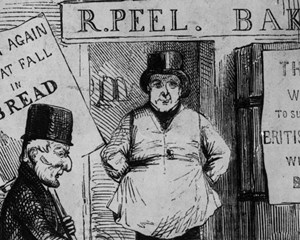Finance & economics
財經板塊
Corn Laws scythed, 175 years on
《谷物法》被收割后,175年過去了
The appeal of Peel and repeal
皮爾的上訴和廢除
What the end of Britain's Corn Laws in 1846 says about free trade today
1846年英國《谷物法》的廢除對今天的自由貿易有什么啟發
About half of most British people's income in the 1830s and 1840s was spent on food. Hunger was commonplace, occasionally sparking riots. Contributing to the high cost were tariffs on imported grain, called the Corn Laws, which soared as high as 80%. The system enriched aristocratic landowners when most Britons were not allowed to serve in Parliament or vote.
在19世紀30年代和40年代,大多數英國人大約有一半的收入花在食物上。饑餓是家常便飯,偶爾還會引發騷亂。對進口谷物征收的關稅,也就是所謂的《谷物法》,導致了高昂的成本,關稅飆升了80%。當大多數英國人不被允許在議會任職或投票時,這種制度使貴族地主們富裕起來。

Facing public anger, a famine in Ireland and fears of starvation in Britain, the prime minister, Robert Peel, introduced legislation to end the tariffs. On June 25th 1846 the House of Lords repealed the Corn Laws, following a House of Commons vote a month earlier. It marked a major moment in the history of open economies. How it was achieved offers lessons to those defending the global trading system today.
面對公眾的憤怒、愛爾蘭的饑荒和英國對饑餓的恐懼,總理羅伯特·皮爾提出了終止關稅的立法。1846年6月25日上議院廢除了《谷物法》,此前一個月下議院進行了投票。這是開放經濟體歷史上的一個重要時刻,它的實現方式為今天捍衛全球貿易體系的人提供了教訓。
The first lesson is to organise a broad coalition and creatively use the media. It was not simply the poor who had an interest in lower grain prices. A new generation of prosperous manufacturers and moralminded aristocrats joined forces. They established what might be one of the first lobbying groups, the Anti-Corn Law League, which hosted rallies, financed research and supported political candidates. Books and pamphlets sprang up to make the case. The Economist itself was founded in 1843 to campaign for the abolition of the Corn Laws and for free trade.
第一個教訓是,組織廣泛的聯盟,創造性地利用媒體。不僅是窮人對較低的糧食價格感興趣,新一代繁榮的制造商和有道德的貴族也聯合到了一起。他們建立了反谷物法聯盟,這可能是最早的游說團體之一。該聯盟主辦集會,資助研究,并支持政治候選人,書籍和小冊子也紛紛涌現。《經濟學人》本身成立于1843年,其宗旨是為廢除《谷物法》和自由貿易而戰。
譯文由可可原創,僅供學習交流使用,未經許可請勿轉載。











